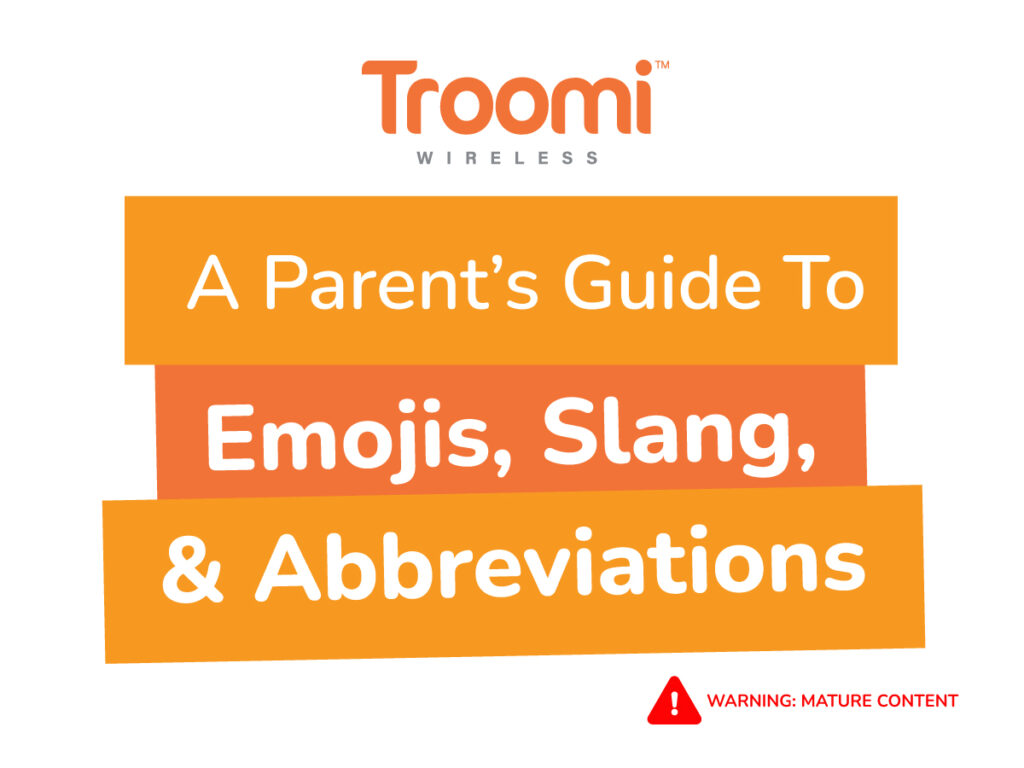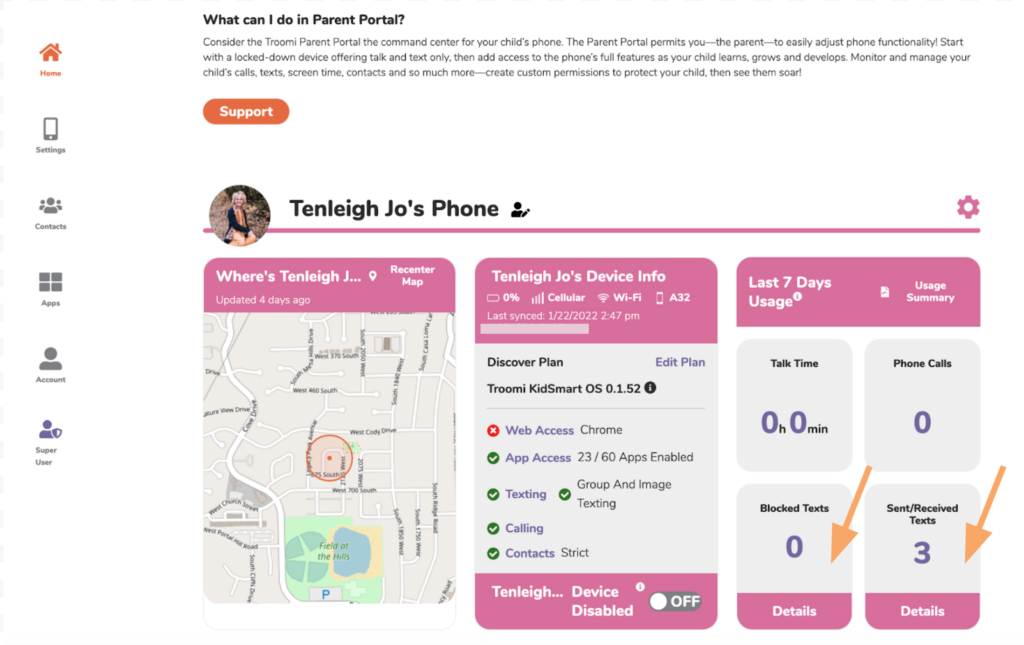
Texting has made it so much easier to communicate. Unfortunately, it’s also made it easier for unwanted or dangerous material to fall into our children’s laps. It’s important that parents are able to keep an eye on their children’s texting habits—and with Troomi, you can!
Text tracking is the newest addition to the Troomi tool belt. Through this cool new feature, parents can review texts and talk about them with their children, opening up a dialogue about safe and responsible phone use. After all, the world of technology is a frightening place, and many kids need a guiding hand so they don’t get lost. The discussions that text tracking prompts will ultimately help your kids develop a sense of responsibility and build healthy phone habits.
So (drum roll, please), let’s get into it!
How Do I Use Text Tracking?
Using the Text Tracking feature couldn’t be easier. Here’s a step-by-step guide to how it works:
- First, log onto your favorite website, the Troomi Parent Portal.
- Navigate to the Parent Portal homepage.
- In the far-right section titled “Last 7 Days Usage,” you will see some stats about your child’s phone usage.
- Click on the “Details” button underneath either the “Send/Recieved Texts” or “Blocked Texts” square.
- A screen will pop up entitled “Text Message Audit.”
- Here you can see what your child is texting about, and to whom.
- To change the date range, click on the dates underneath “Start” and “End.”

It’s as simple as that!
When Should I Check My Child’s Texts?
Keeping up with your kids’ lives is an important part of responsible parenting, but make sure to do it correctly. Set clear intentions with your children from the beginning, and remember that there’s a difference between protecting your kids and spying on them.
If your child is acting differently or you sense that something weird is going on, you may feel the need to check your kids’ texts and devices more frequently. On the other hand, if you have a high level of trust with your kiddos, you may not need to use the text tracking feature for anything more than the occasional check up.
Every child is different, and you know your kid better than anyone. Keep in mind that you may not like what you find when looking at your child’s texts. If this is the case, check out this article by Verywell Family about how to handle finding disturbing content on your teen’s phone.
What Should I Be Looking for When Reviewing Texts with My Child?
Phones are an indispensable tool, and texting is the preferred method of communication for over 70% of teens, according to the Pew Research Center. But what are these kids texting about, and what red flags should parents keep an eye out for?
- Disagreements or drama with friends. The intent of text messages can be warped by something as simple as one change in punctuation. A simple response may be taken the wrong way and this can lead to disagreements, especially among teens. Text tracking helps you help your kids work through friend drama—and Troomi’s guide to phone and texting etiquette is a great resource to help with the miscommunication.
- Cyberbullying. In today’s world, bullying is digital. When checking your child’s texts, keep an eye out for any cyberbullying that may be going on—whether your child is being cyberbullied, or is the bully themselves. If you’re worried about this, keep an eye out for the warning signs of cyberbullying and know how to prevent it.
- Sexting. You’re probably aware of sexting and its dangers, but your kids maybe aren’t. Remind them that there’s no guarantee that their messages won’t be shared with someone else, and that they can even face legal repercussions for sexting.
- Pornography. Sexting is no good, but it becomes even more dangerous once photos are involved. Pornography is dangerous to young people, and it’s important that parents know how to protect their kids from its claws. If you do find some on your child’s phone, have an open dialogue with them about the dangers and risks they are facing by consuming that content.
What if My Child Uses Slang I Don’t understand?
Hey fam! That was so cringe yesterday when that basic Karen spilt the tea about being ghosted, no cap. She’s so extra, periodt!
Did that make any sense? If you’re the parent of a teen, you’ve likely heard your child use slang like this. Language is always evolving, and the prevalence of texting and chat rooms has led to the creation of a new form of language – phone language, also called textspeak.
Parents might have a hard time knowing just what kids mean when they use this new language. And while it’s important that teens have some privacy from their parents, it’s just as necessary for parents to be able to decipher what kids are saying. After all, kids and teens may use textspeak to have secret conversations about things like drugs and sex. It’s vital that parents are able to decode these hidden discussions in order to protect their children from life-ruining habits and sexual predators.

Because of the sensitive (and sometimes explicit) nature of internet slang, emojis, and abbreviations, we have chosen to link out to our list of definitions. We know that this information is invaluable to you as a parent, but consider yourself warned this list includes mature content! View our emoji definitions here. View our slang and abbreviation definitions here.
Good Luck Out There, and Happy Parenting!
Phones are a valuable instrument. Like all instruments, however, they are easily misused. As parents, it’s our responsibility to prepare our children for the future by teaching them about responsible phone habits—especially when it comes to texting.
With Troomi’s new text tracking feature, you have one more tool in your arsenal against technology addiction. It’s also a great way to open up a conversation with your kids, so as to increase your level of mutual trust even more.
And don’t forget to keep an eye on the Troomi blog for more exciting updates!
